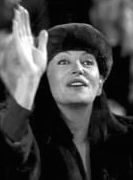Friday, February 15, 1991.
AN IMAGINARY TALE (Une histoire inventée). Co-written by Jacques Marcotte. Music by Serge Fiori. Co-written and directed by André Forcier. Running time: 100 minutes. In French with English subtitles. Rated 14 Years Limited Admission with the B.C. Classifier’s warning: occasional nudity, suggestive scenes and very coarse language.
FEDERAL CULTURAL COMMITTEEMEN are not required to explain their decisions. Who knows why they chose An Imaginary Tale (Une Histoire Inventée) as "Canada's official selection" for Academy Awards consideration as a foreign-language feature nominee?
Academy members have no need to explain. When their votes were tallied, the Québécois comedy was not among the surviving five.
Explanation is left to the critics. For me, director André Forcier’s outré after-hours fantasy lost all its charm and comic momentum during the rape scene.
Up to that point, it is the cheerfully silly story of men seeking creative fulfillment and women co-opting them for love's sake. At its centre is Montreal beauty Florence Desruisseaux (Louise Marleau).
An erotic legend, she can have almost any man she wants. The trouble is that the man she wants is indifferent to her.
Aging jazz trumpeter Gaston Turcotte (Jean Lapointe) wants only to keep his performing combo together and employed.
Their troubles are compounded when Florence's adult daughter Soledad (Charlotte Laurier, Quebec's answer to Linda Blair) catches her boyfriend Jean-Pierre Tibo (Jean-François Pichette) in flagrante with a pretty blonde (Louise Gagnon).
A fledgling actress, Soledad is making her stage debut opposite Tibo in an "experimental" production of Shakespeare's Othello. To make him jealous, she decides to have that jazzman Turcotte, "the only man to resist my mother."
In response, Tibo rapes her.
Outdoors in the street, in the snow on the hood of a parked car, he "proves his love" with a violent sexual assault.
Normal men are turned off by rape. For normal filmgoers, Forcier's variation on director Spike Lee’s Mo' Better Blues [1990] stops dead at this point, the victim of an ugly emotional miscalculation.
Successful neither as a love story nor as an erotic fantasy, An Imaginary Tale is a sick, sour failure.
The above is a restored version of a Province review by Michael Walsh originally published in 1991. For additional information on this archived material, please visit my FAQ.
Afterword: Une histoire inventée was André Forcier’s sixth feature film and, to the best of my knowledge, the first to be released commercially in Vancouver. Had I been more familiar with his work, I might have been more sympathetic to the picture overall. Much later I learned that it marked a turning point in a career that had started with an 8mm film called La mort vue par . . . (Death Seen by . . .). His 1966 short won a student film award and the attention of director Gilles Carle, who encouraged Fortier to develop his talent. He made his feature debut in 1971 with a youth rebellion drama called Le retour de l'immaculée conception (The Return of the Immaculate Conception). Although the Toronto-based critic and film historian Gerald Pratley called Forcier’s second feature, 1974’s Bar Salon, “extraordinary . . . observed with a stark realism and love for the lower depths of cinematic expressionism,” its distribution outside Quebec was confined to film festival screenings. A decade later, in Peter Morris’s 1984 guidebook The Film Companion, Forcier is described as “the best talent of the younger generation of Quebec filmmakers.” All but unknown to Canada’s English-speaking audience, Forcier was hailed by Francophone critics as the “enfant terrible of Quebec filmmaking,” and the “Québécois Fellini.” To those familiar with his previous work, Une histoire inventée represented the point where he moved in a new direction, lightening up and becoming increasingly surreal.
In retrospect, I’m embarrassed that I was an English-Canadian critic more familiar with the career of Spike Lee — at the time an African-American filmmaker whose features focused on the black experience in Brooklyn — than with that of a man who, in a 1994 profile, was Identified by Montreal film journalist Marie-Claude Loiselle as the “greatest contemporary Quebec filmmaker.” Of course it was my job, as a daily newspaper movie reviewer, to write about films that opened in Vancouver’s theatres. Forcier’s examinations of the French Canadian experience were not among them. And yet he persisted, amassing honours and becoming an icon of Francophone cinema in the process. He’s directed 14 features to date and, in June 2017, Montreal-based Éditions Les Herbes rouges published critic Loiselle’s La communauté indomitable d’André Forcier, an analysis of the director’s work to date. He turns 70 today (July 19).
